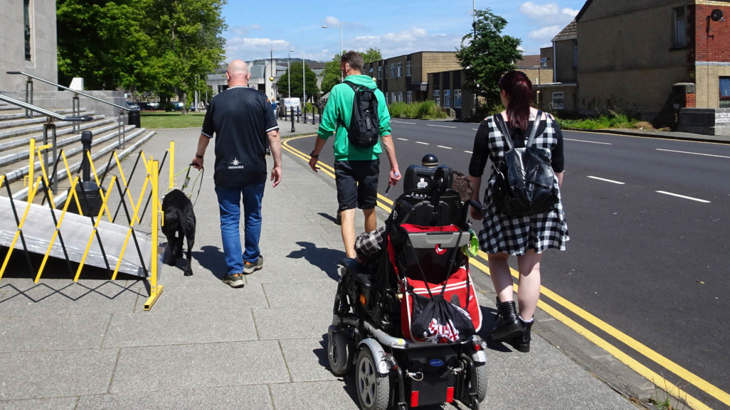Sustrans, in partnership with Transport for All, is doing crucial research to ensure disabled people are represented when places transform the way we move around. This project is generously funded by a user research grant from the Motability Foundation.

For a fairer future, we must create more inclusive, equitable, and sustainable transport systems across the UK. Photo: Alan McAteer
Imagine a world where our entire transport system is restructured to prioritise people over vehicles, creating an integrated network to connect every part of our cities and towns.
This vision isn’t just about getting from one place to another. It’s about enhancing our quality of life, improving public health, and fostering a sustainable future.
Transformative changes such as pedestrianised streets, comprehensive cycling networks, and low-emission zones are just the beginning.
To do this, we need a holistic transformation of how we move around—one that is designed with everyone in mind.
By creating a connected, efficient, and inclusive transportation system, we can dramatically reduce our carbon footprint, improve air quality, and drive economic growth.
This should start with disabled people.
Disabled people take 38% fewer trips than non-disabled people (Motability, 2022), and 41% of disabled people often experience problems reaching their destination due to accessibility (Sustrans, 2023).
71% of disabled people said they would like to use environmentally friendly modes of transport more but often do not have a choice (Transport for All, 2024).

Dennis, Greater Manchester
Although access to buses, trams and trains in Manchester has improved, nobody’s thought about how you get to them from your house.
We need honesty and dialogue to understand that it’s not just about the accessibility of buildings and buses, it’s about how we get to them in the first place.
Read Dennis' full story from the Disabled Citizens' Inquiry.
Transforming our transport systems
To address this, Sustrans and Transport for All have launched a groundbreaking research project, powered by funding from the Motability Foundation, to ensure that disabled people are at the heart of future mobility transformations.
This partnership aims to shake up how we think about transport planning by putting those often sidelined in the lead, ensuring that their voices help to shape the communities in which they live.
The importance of representation
The Transforming Mobility project is grounded in the belief that disabled people must be at the heart of any discussions and decisions around mobility changes.
Their input is crucial to developing systems that are not only accessible but truly inclusive, to create communities where everyone can thrive.
In a world fractured by “culture wars”, polarised views are often the loudest but do not reflect what most residents think.
Misinformation is widespread and debates increasingly co-opt disabled people without consulting them.
For places to be successful in transforming transport systems, disabled people must represent themselves. And our politicians and officers must be supported to bring disabled people with them on this journey.

Disabled people must be brought into the conversation on transport planning in order to properly represent their views. Photo: Sustrans
Key research questions
To drive forward change, it's crucial to understand how disabled people are currently represented in transport plans, their specific needs and motivations, and what truly inclusive mobility should look like.
Inclusive mobility involves designing systems that accommodate everyone and can be improved by actively involving disabled people in planning to understand how to address climate change, health, and transport inequity.
Local collaboration
To get to the heart of these questions, the project involves a mix of interviews and workshops in selected locations across the UK.
So far, we’ve held interviews with local authorities to explore current transformative transport plans, their engagement with disabled people, and the challenges and support needed for inclusive planning.
Workshops and collaborative efforts
Next, Sustrans and Transport for All will host two sets of workshops in Oxford, Edinburgh, and Birmingham from September 2024 to February 2025.
We’ll bring together local officers, decision makers and disabled participants to explore and develop solutions for transformative mobility.
Additional research will include a representative survey of disabled people across the UK, as well as collaboration with transport planners in Leuven and Ghent, Belgium, to learn from their innovative mobility strategies
To benefit from sharing good practice and lessons learned, an advisory panel with a wider group of local authorities has also been set up.
This approach grounds the research in real-world experiences of both disabled individuals and transport planners.
Shaping the future of inclusive mobility
The findings from this research will be used to produce a final report, enabling other areas in the UK to learn from the experiences of the participating cities and creating a framework for what meaningful engagement looks like.
By ensuring that disabled people are not only included but central to the planning process, this project aims to create more inclusive, equitable, and sustainable transport systems across the UK, ensuring that no one is left behind as we move towards a greener, fairer future.
Look out for updates as we move this project forward alongside our partners, Transport for All.
Find out about our work to make walking and wheeling more accessible.
Use our Walking and Cycling Index Data Tool to explore how we live and move around our local areas.





